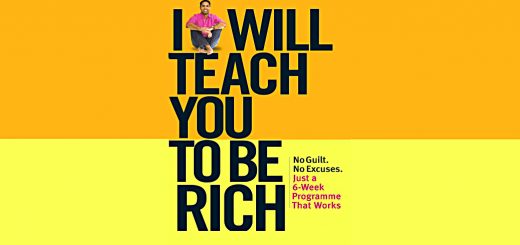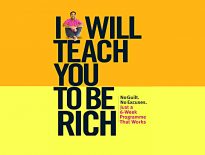I Will Teach You To Be Rich 2 – Banks, Pensions & ISAs

Today’s post is our second visit to a new book, the popular I Will Teach You To Be Rich by Ramit Sethi.
Contents
Banks
Chapter 2 of Ramit’s book is about bank accounts.
I don’t think that there’s too much to think about with current accounts.
- I’ve had the same one since before college, for 40 years now.
Banking in the UK is (unusually) free, and current accounts always pay less interest than savings accounts.
- Accounts with fees are very rarely worth the cost.
Some current accounts pay interest, but there will be a cap on how much money you can have in them (often only a few £K) which means that the interest is insignificant within your financial lifeplan.
So historically, what you needed was a convenient branch.
- Which meant one of the big four banks, who were most likely to have branches close to both your home and your work.
Easy access to free cashpoints was a massive plus.
Today, nobody wants cash and a lot of banking is online.
- So maybe you can pick on the basis of the app.
Young people tend to be fussier here.
- I use apps from four banks at the moment (for personal and business accounts) and they are all fine.
Savings accounts
Savings accounts are a different matter.
- Sometimes interest rates are high and you need to get your money into a decent account.
But that hasn’t been the case for the past fifteen years, and it doesn’t matter that much where you park your money.
- Half of my ready cash is in Premium Bonds.
Don’t keep too much cash in your savings account.
- Six months of spending is the usual recommendation.
Retirees and those living through a global pandemic might want to keep a bit more.
A Cash ISA can be seen as a savings account, but I recommend that you avoid cash ISAs altogether.
- Save your ISAs for long-term investment, which means stocks not cash.
How banks make money
Ramit explains that banks make money on the spread between the interest they pay you and the rate they charge to borrowers.
- That’s why P2P lending seemed like such a good idea at first – it was a form of disintermediation.
- But when you cut out the middle man, you also cut out the bank taking on the risk of default.
Banks also make money from punitive overdraft fees.
- So don’t go overdrawn.
Compensation
He also explains the government compensation scheme.
- Don’t put more than £85K with the same group (not the brand – for example, Halifax and Bank of Scotland are the same things).
- There are lists of the current groupings on the internet.
There’s an extension of the scheme for larger sums from eg. the sale of a property, but this is usually valid only for six months.
Foreign banks often operate under their home licence (or did, when the UK was part of the EU).
- Foreign schemes often have lower limits than in the UK – sometimes as low as €20K.
Bank marketing
Things to look out for with bank marketing include:
- teaser rates
- minimum balances
- up-selling of expensive accounts
- bundled credit cards, insurance etc.
Ramit repeats his suggestion from the credit card chapter to try to negotiate down all fees.
- Presumably, this tactic plays better in the US.
I would also say that it’s better to avoid the fees in the first place and that fees should not be a significant part of your financial life.
Pensions and ISAs
Chapter 3 is about getting ready to invest.
Ramit points out that historical real returns from stock markets are around 5% pa.
- With prices as high as they are today, and interest rates as low, you might have to settle for 3% pa after inflation for the foreseeable future.
The downside of course – as we have seen this year – volatility.
- The best approach is to think of your investments as money that is inaccessible until retirement.
- Pensions can help with this since they really are inaccessible (until at least age 55).
For young people (Ramit’s target audience) crashes are arguably helpful since it means that they can invest on the cheap (but low, sell high).
Lots of people are also put off investing because they think it is complicated, but in fact, it has become very simple over the last 15 years.
- All you need to do for the first few years is buy a few low-cost index funds inside a pension and/or ISA (both shelters which let your investments grow without annual tax).
Pensions give tax relief on the way in, but you will pay some (usually a lot less) tax on the way out.
Ramit calls pensions “pre-tax” and “tax-deferred” accounts.
- In the UK system they are known as EET (exempt, exempt, taxed).
ISAs are filled with money that has already been taxed, but there is no tax on later withdrawals (after, we hope, a lot of growth).
- In the UK system, this is known as TEE.
At the very least, you should max out your company pension to trigger the employer match (which is free money).
- Company pension contributions are deducted automatically (a form of “paying yourself first” which is a useful psychological trick).
Ideally, fill your SIPP and ISA every year (very difficult, but this will make you financially independent quite quickly).
When you change companies you need to decide whether to:
- leave your old pension with your old firm
- move it to your new firm
- move it to your SIPP (Ramit prefers the simpler but more restrictive stakeholder pensions to SIPPs).
Unless your company pension is particularly cheap or has access to special funds, your SIPP should be the best option.
- You might want to get financial advice before you do this, but it will be expensive and won’t provide any insights that you couldn’t find out for yourself.
Ramit points out that lots of old people have money worries because they didn’t prepare for retirement.
- And that lots of young people have unrealistic expectations, believing they will win the lottery, or become rich and famous, or inherit money.
So you must save.
- Consumption and Keeping Up with the Jones are the enemy.
- Compounding is your friend.
The Ladder of Personal Finance
Ramit has five steps for everyone to go through:
- match your employer pension scheme to its limit
- pay off the credit card and other debt
- open an S&S ISA
- open a SIPP (or pay even more into your employer scheme)
- overpay your mortgage and think about more education
If you are a higher rate taxpayer, SIPPs are better than ISAs.
Well, that was quick – we’ve covered another 20% of the book.
- The two chapters we looked at today were pretty basic.
Up next are Budgeting and Maintenance.
- Until next time.














